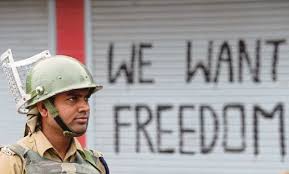The United Nations (UN) has ended its long silence on Kashmir and has quietly increased pressure on India in recent months, diplomats and human rights activists say.
They said India was criticized at the opening of the 35th session of UN Human Rights Council in Geneva on Tuesday.
This happened for the third consecutive session of the Council, and diplomats and human rights defenders say this is unprecedented, they said, adding: “The coming days indicate New Delhi could face more international diplomatic challenges on Kashmir.”
“We continue to receive reports of increasing violence, civilian casualties, curfews and website blackouts” in Kashmir,” said UN High Commissioner for Human Rights, Zeid Ra’ad Al-Hussein, in his Opening Statement at the start of the 35th session of UNHRC.
The opening statements by the UN human rights chief highlights issues that deserve top international attention. For decades, Kashmir slipped out of the list and was forgotten. But starting in September 2016, Kashmir made a surprise return to the UN human rights agenda. Al-Hussein delivered a comprehensive speech at the start of the session, tackling issues as diverse as ISIS, Syria, Israel, Iran and Cuba.
UN’s top rights chief raised Kashmir in his policy statements in September, March and now in June.
The inclusion of Kashmir in the list of top world conflicts that require urgent international attention led to immediate reactions from state diplomatic missions and international NGOs participating in the UNHRC session.
“It is a major development when Kashmir gets mentioned in the policy statement of top UN official for third time in a row,” said Altaf Hussain Wani, leader of the Kashmir Delegation to UNHRC.
The Kashmir Delegation includes Kashmiris from Indian and Pak administered Kashmirs, and Pakistan, which is home to the largest population of Kashmiris outside the conflict zone.
Syed Faiz Naqshbani, a human rights defender attending the UN session, who belongs to Indian administered Kashmir, said that mentioning Kashmir at the top UN rights forum three times consecutively for the first time in decades points to major developments in coming days.
A Western diplomat, who preferred not mention his name because he was speaking informally, said developments inside Kashmir and at the UN could spell trouble for India.
“It is clear that India is unable to control the situation on the ground in Kashmir despite being a big county with a large army and security forces. The world community might have to step in to do what India and Pakistan are unable to do, which is to resolve the conflict,” he said.
An eight-member Kashmir Delegation is currently at the UN in Geneva. Beside Wani and Naqshbandi, the delegation consists of Sardar Amjad Yousef, Shamim Shawl, Hasan al-Banna, Shagufta Ashraf, and Ahmed Quraishi.
United Nations ends half a century of silence on Kashmir: Human Rights Activists




